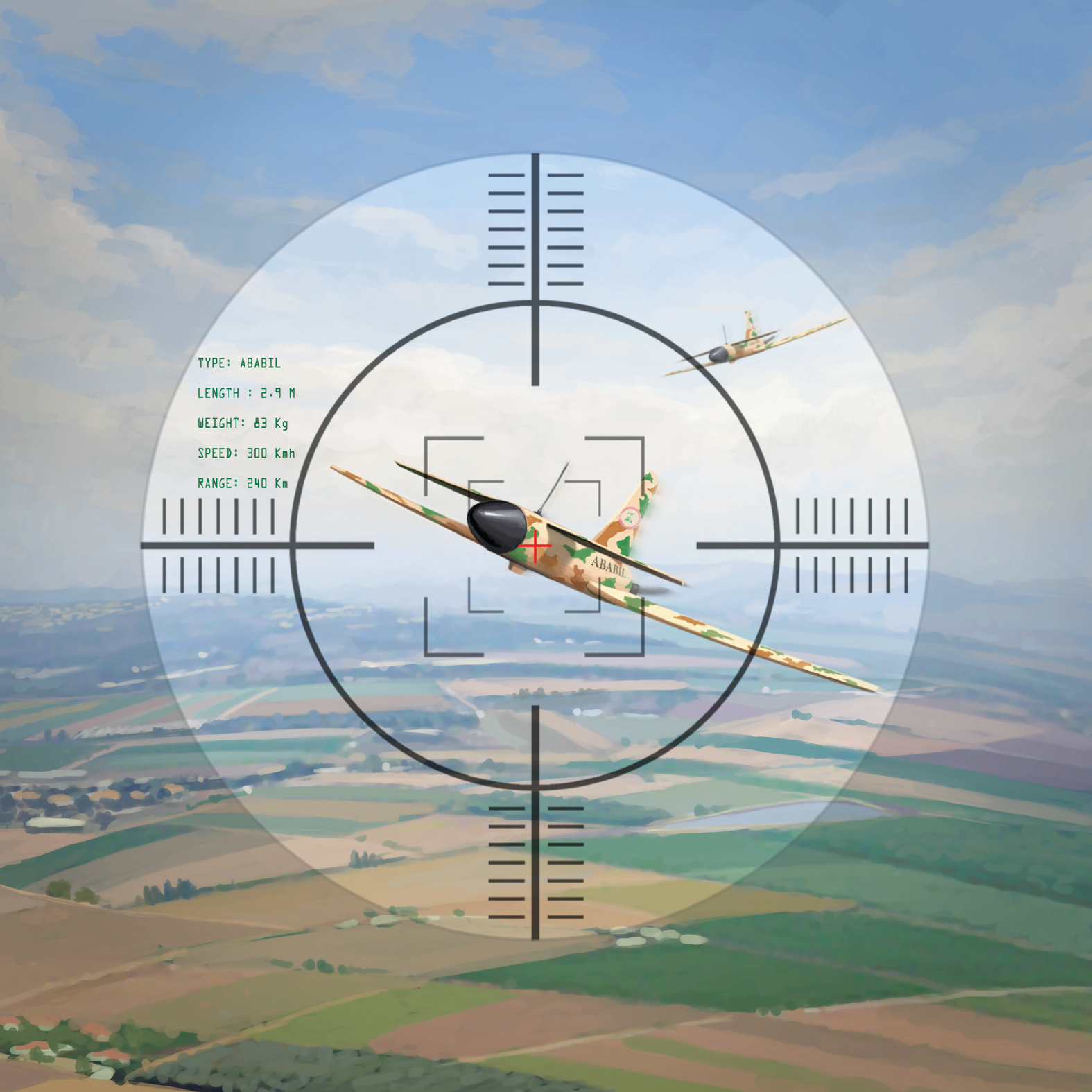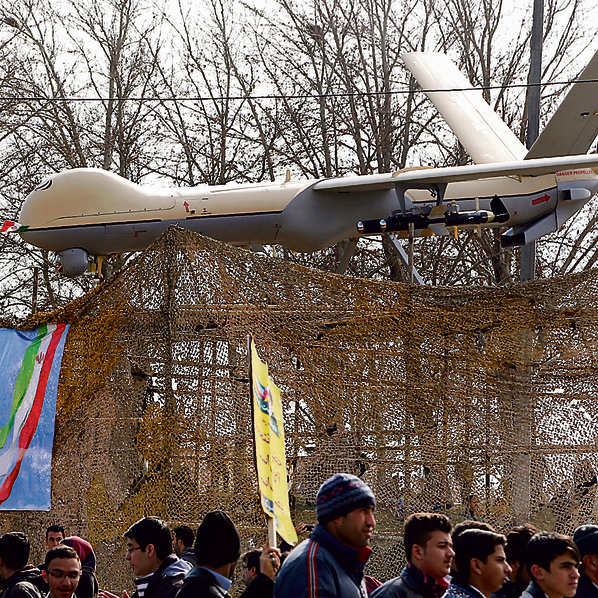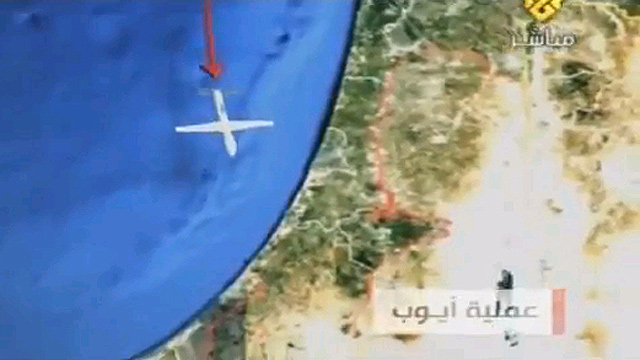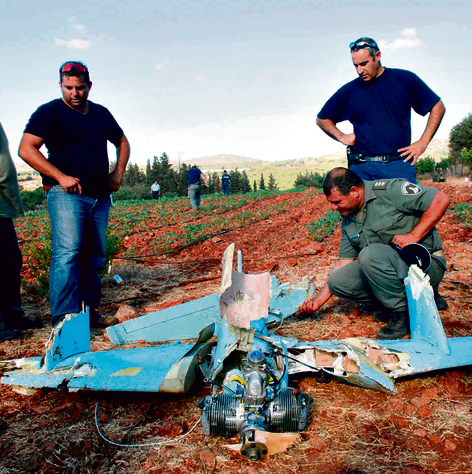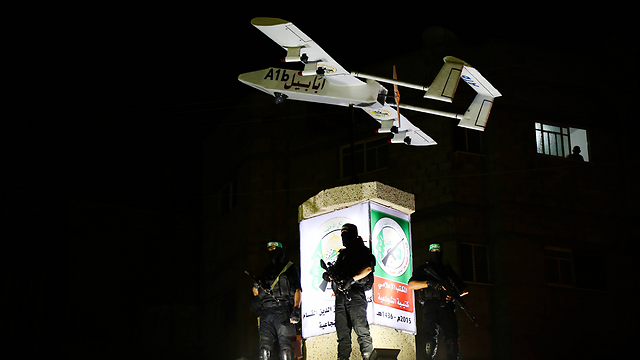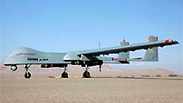
The Defense Ministry's failed handling of Hezbollah drone threat
In recent years, several Iranian-made drones sent by Hezbollah and Hamas managed to infiltrate Israeli territory with impunity. Meanwhile, the Defense Ministry is taking its time procuring practice drones for IAF pilots to train with. For some reason, a model airplane enthusiast and a jeep company were contracted to build the practice drone, while leading companies like Elbit, IAI and Rafael opted out of bidding on the tender altogether.
On July 17, 2016, a foreign drone coming from Syria infiltrated Israeli airspace, and the IDF's entire aerial defense array failed its attempts to shoot it down. A fighter jet was scrambled, Patriot missiles were launched—but all in vain. The drone turned around and flew back to Syria, and the only thing that fell inside Israeli territory that day was shrapnel from the missiles that were fired at the drone, which injured a young girl in a kibbutz in the north.
Shortly before that, the Olinky family from Ness Ziona, who owns a small company called Chai Distributors, received interesting news. Their company may specialize in machine oil, but it won a unique contract from the Defense Ministry to provide the Israeli Air Force with an answer to the new threat in the sky: Drones that fighter pilots could use for target practice.
"My brother deals with model airplanes and drones," Yitzhak Olinky, who works at the company, tried to explain. "This has nothing to do with the company other than the fact he is my brother and he also works with us. The fact he's building model airplanes has nothing to do with machine oil. That's just something my brother does."
Shooting down an unmanned aerial vehicle (UAV, or a drone) is complicated, and Israel's aerial defense array has encountered some difficulties in the field over the past few years. Quite a few drones were intercepted, but too often it took too long to shoot them down, and there were quite a few misses.
The defense establishment decided to do something about it. Almost three years ago, the Defense Ministry turned to the biggest companies in the field to find one that could provide the IDF with a product that is meant to be quite simple in nature: A practice drone. In other words, a fairly cheap flying target that could be shot down during training to help prepare fighter pilots for the real thing.
But Yedioth Ahronoth's investigative team has learned that the search so far included mostly baffling decisions, a lot of foot-dragging, lolly-gagging and repeated failures—all of which shocked experts in the field.
The result was abysmal: The tenders being issued kept failing, with no serious company bidding on or winning them. And so, while Israel is considered an international power in the field of drones, the mission to save the IAF from its next failure has been entrusted to small companies that have absolutely nothing to do with the field.
The tender that the Ness Ziona company won—which is meant to help the Air Force prepare for the threat more efficiently—has been dragged out for almost three years without success. It was first issued in 2014 and failed, and again in 2015 when a different company that repairs off-road vehicles, got it. After having won, the company itself realized the Defense Ministry's requirements were too much for them to handle, and quickly backed out of the project.
And so the project kept trudging on and encountering more and more snags along the way, until it recently ended up with the machine oil company from Ness Ziona.
Gilad, a member of the family, is a talented model airplane enthusiast who was willing to invest great efforts in building what the Air Force needs, but he too is far from having the abilities of Israel's veteran drone companies, such as the Israel Aerospace Industries (IAI) or Elbit Systems.
Since he doesn't even own a company in the field that the defense establishment could have given the contract to, the deal was signed with his family's machine oil company. But this effort also ended in naught, as expected, leading the Defense Ministry to once again search for a solution.
Meanwhile, the Air Force doesn't have the practice drone it wanted. One can only hope the citizens of Israel don't have to pay the price in blood.
Fighting against the Ababil
Recent years saw several infiltrations of unmanned aircrafts into Israeli territory, leading officials in the defense establishment to realize this was a growing danger. The Iranian-made Ababil drone, which Tehran gave Hezbollah, infiltrated Israel at least four times, with the Lebanese terror group boasting its success by claiming to have reached "the northern Palestine skies."
In October 2012, for example, one drone particularly embarrassed the IDF when it flew across the country, made it all the way to southern Israel and was only shot down by a fighter jet when it reached the Mount Hebron area.
In July 2014, the IDF learned that Hamas also had the Iranian-made drone when the Gaza terror group managed to infiltrate Israel with one that was only shot down when it reached Ashdod.
And if that's not enough, recent reports indicate Hezbollah has equipped the Ababil with bombs, which it was dropping deep inside Syrian territory.
If at first Israel hoped these drone infiltrations were isolated incidents, with time, it became apparent that action was required.
"No one was worried about the first rockets and first Katyusha rockets either," said Brig. Gen. (res.) Daniel Milo, the former commander of the IAF's antiaircraft array. "The problem is that with time, the enemy develops an operational pattern, and when we came under fire of over 200 rockets on the darkest day of the Second Lebanon War, it set us straight. That is why the Air Force needs to train for the next stage when the enemy would be able to get several drones in the air at the same time."
All are in agreement that to deal with the new threat, the Air Force needs to conduct specialized training to improve its performance.
"When something is defined as a threat, then of course training is required," said Brig. Gen. (res.) Shachar Shohat, who was the head of the Air Force's aerial defense array until a year ago.
The problem with this kind of interception—as absurd as that may sound—is actually the primitive nature of the infiltrating drone. The radar has a hard time identifying such a small and slow aircraft and even after it is identified, it's hard to intercept the drone—mostly due to its small engine, which does not leave a heat signature for the advanced missiles to hone in on.
"It's part of the a-symmetry of the modern battlefield," Shohat said. "It is actually the cheap and less sophisticated aircrafts that pose a significant challenge to militaries with advanced technologies."
"Scrambling a fighter jet with missiles, and spending at times a million dollars on what the kids call a 'tiara' (a plain target), is not only strange, it's also complicated," added Brig. Gen. (res.) Milo. "The fighter jet moves at a speed of one kilometer in four seconds, and it needs to get the 'tiara' that is barely moving—but there are flukes."
Milo says that generally speaking, the ammunition was not meant to be used on such targets. "There are missiles that can identify heat, but they were meant to locate a 16-meter aircraft with engines that emit such heat that if you stand behind (them), you'll turn into a burger. It's nothing like a drone."
'Hell if I know what they did'
This prompted the Defense Ministry into action and in 2013 it issued a tender looking for an external consultant in the field. Aharon Vered, an Air Force veteran with decades of experience in the field of drones, was hired.
Then, in February 2014, the ministry sent out a document to Israeli companies that specialize in drones, explaining what the Air Force was looking for. "The Air Force is looking for a practice enemy drone for interception training" to practice "risk management of different types of threats," it said.
Until that point, pilots only trained twice a year using drones from abroad. This had to change, the document explained, "due to the need for a lot of training days." That is why the Air Force needed "a platform that can be used for intensive training with high availability throughout the year," which will be "cheap, safe, and easy to operate; allow to stage threats; and has qualities as similar as possible to the enemy drones."
No one thought to entrust this task to a novice, which is why the document stressed that the company that wins the contract will be required to prove "its operational experience, the amount of flights (it conducted), its level of credibility, its ability to meet deadlines, and the number of crashes it experienced to this date—if there were any."
To ensure that no one thought to "experiment" at the expense of the Air Force, the tender further stressed that it would "not consider systems still in developmental stages," and that the training will be done "based on tried-and-true existing systems."
The winning bid, the document clarified, must meet the IDF's requirements at short notice in all areas of the country, so the Air Force jets could "practice locating and intercepting enemy drones in any area necessary, during the day and during the night."
The Defense Ministry's experts had Hezbollah's Iranian-made drone—which boasts a speed of up to 160 knots (about 185mph or 300kph)—in mind when they issued the tender. According to the accompanying document, the practice drone must "reach a minimal flight speed of 60-140 knots, with an option of up to 250 knots."
The drone must also have a piston engine, so the aerial defense systems would have a hard time identifying and intercepting it, thus simulating the real threat. The required flight time was "at least one hour."
Ahead of the tender's publication, the Defense Ministry approached several leading companies in the field—the Israel Aerospace Industries (IAI), Elbit Systems and Rafael Advanced Defense Systems—but the deadline passed, and no deal was made.
"It was obvious this would happen," a defense official explained. "The requirements of the tender entailed high costs, but shockingly enough, when (the ministry) approached the companies, they initially didn't commit to paying for even one day of work. They just didn't list the number of 'operational days' the winning bidder would get. The expenses surrounding such a system could get to a million shekels, I estimate. What kind of an idiot would agree to get into this thing without basic commitments being made? Professionals in this field very much want to work and contribute to security, but it was obvious to me that no deal could be closed in this manner."
And so, less than six months later, at the end of 2014, an official tender was issued for the first time, with an update: Adding eight fully paid work days and shortening the timetable for the drone to become operational.
But these weren't the only changes. At this point, the external consultant Aharon Vered was no longer involved in the process and the tender included other significant changes: The flight time for the drone, which was previously one hour, was now increased to three hours. The winner of the bid was also required to show capability for 10 hours of continuous flight over two targets with several drones. The required speed, which was similar to the Iranian-made Ababil, dropped: Instead of reaching a speed of up to 250 knots, the tender required a speed of only 100 knots.
"Hell if I know what they did there," Vered recently said in a private conversation. "The guys at the Government Procurement Administration cooked up that tender. Quite a few companies were interested during the initial stages, but later, almost all of them disappeared. The Defense Ministry decided it knew how to do this on its own, and the result is everything that's happening right now."
And so, despite the changes made to the tender's requirements, no one had bid on it, except for one company whose bid, according to the Defense Ministry, "was ten times over the estimate" so the tender was canceled. The same company told Yedioth Ahronoth that it did not bid on the tender, and that it merely tested the waters and decided to pass up because the requirements were "delusional," as one senior company official put it.
"They acted unprofessionally, which is why no one met the tender's requirements," said Ronen Nadir, whose company BlueBird Aero Systems—a leading company that sells drones all over the world—also looked into the tender but chose not to make an offer.
"I can't give details," he said, adding that defense officials are starting to worry. "Those who need to panic are now panicking."
To intercept or not to intercept?
The new tender requirements made the desired product more expensive, to the point that it wasn't financially worthwhile to shoot it down.
"There is a big difference between a drone that flies for an hour to one that can fly for three hours," explained John Delamater, the president of AeroTargets International, an American company that manufactures practice drones for Western militaries. "It uses a lot more fuel, it's heavier, and if on top of that they require high speed—you need a different engine. Eventually, it definitely makes the drone more expensive."
The next version of the tender in July 2015 was updated again, this time with a changed operational objective in the hopes that perhaps this time, a suitable supplier would be found; From s type of training that includes "identifying and intercepting enemy drones," the updated tender now determined that the fighter jets would work on "identifying and locking onto the target" only—without shooting it down. The Defense Ministry even added a clarification on the matter, saying a special payment will be added "if the Air Force decides to shoot down the drone."
There is a sizable industry of practice drones in the world, with some of the manufacturers offering reusable drones to save money. But when the budget shrinks, the efficiency drops as well.
"When a soldier is training and something is actually falling, his ability to be sharp is different," Milo explained. "A real takedown is not a simulation. There's no better practice."
"Live fire is sometimes necessary," Delamater agreed. "The US Armed Forces train like that—interception of aerial targets as well as surface-to-air missiles. To train the teams to accuracy, they check the success rate statistics and improve upon it."
The updated tender also included a commitment by the Defense Ministry to pay the winning bidder for 44 work days spread over two years and to present the winner of the contract with a work plan six months in advance.
And so, over a year and a half after the search had begun, two bidders were found: the veteran BlueBird Aero Systems, whose offer was higher than its competitor, Pro Jeep—a company from northern Israel that specializes in repairing and upgrading 4x4 vehicles and also sells camping equipment. Surprisingly, Pro Jeep won the bid.
When Yedioth Ahronoth called the company's offices to ask if they also worked with the Air Force, manager Guy Rafael responded: "We deal with jeeps, but we also develop systems."
And are you going to save the Air Force from Hezbollah's drones?
"I don't know what to tell you, but if you need seats for a jeep, come on Monday. We're open until 5pm."
After having won the bid, Pro Jeep's management attended a meeting with the Air Force and Defense Ministry, after which they decided to withdraw their offer.
Shortly thereafter, the Defense Ministry received their first letter on the matter from a veteran engineer called Alon Wallach, the CEO of Wireless Avionics and an expert in the field of drones.
"The practice drones were truly my bread and butter in my work with NATO forces," Wallach told ministry official Lior Lavi. "To the best of my knowledge, there is no Israeli drone that is acceptable both in price and size that meets your requirements of 100 knots and three hours' flight time..."
In his letter, Wallach noted it was a man called Arnie Goren, who works with him in the field in the US, who referred the jeep company to the tender and has been working behind the scenes as an adviser and subcontractor.
"If you haven't been informed of this yet," Wallach continued, "I would like to bring to your attention the fact that Pro Jeep will probably not continue with the project, and the company has known this for several days now... for your information: Pro Jeep has never flown drones, not even model airplanes. It does not have any independent capabilities in the field. Arnie was the one who told them about the tender ... and even led them to bid, helped them answer the questions, and win."
"I thank you for your letter," Lavi responded. "I did not receive any message from Pro Jeep to indicate it had removed itself off the project ... we continue as usual."
Shortly after that, the Defense Ministry received the official news that Pro Jeep had withdrawn from the project, and it was clear there was a problem.
Goren recounted the chain of events that led Pro Jeep to drop the bid. "I came to a meeting at the Defense Ministry with the jeep company's people, and it was simply embarrassing. The guys from Pro Jeep preferred that I keep my mouth shut so as to not anger anyone, but the problems were fundamental. The people handling this project in the Defense Ministry, I think, didn't fully understand. For example, you can't ask for a drone with a scooter's engine that could stay in the air for many hours at high altitudes—10,000-15,000 feet. I was sitting with an Air Force pilot and he asked: 'Wait a minute, why so high?' and then they started whispering amongst themselves."
"They wanted a Mercedes at the cost of a Fiat Uno," Rafael from Pro Jeep said this week. "I realized that if I had won this bid, I would have lost a lot of money."
After Pro Jeep backed out, the Defense Ministry gave the project to BlueBird Aero Systems, which is considered a professional and reputable company in the field.
"At the moment, the tender is still ongoing," Lavi from the Defense Ministry told Wallach. "We're waiting on all the approvals from the Air Force."
But it didn't take long before it became apparent that BlueBird could not meet the project's unusual requirements. "They have a very professional aircraft, but it's far from being able to reach the speed required in the tender," Goren explained. "It was clear that once again the tender would fail."
And so it did. "The tender was canceled," Lavi informed Wallach a month later. "A new tender will likely be issued in the coming days."
'Not enough time'
That was in mid-February. Around that time, another tender was issued—an amended version of the previous one. The requirements shrunk once more, in the hopes that perhaps this time someone would win the contract.
The requirement for a three-hour flight time remained, but the required speed dropped to only 80 knots—a lot less than the speed initially required to match Hezbollah's drone. The cruising altitude also dropped to 9,000 feet.
If anyone expected the industry's giants—Elbit, Rafael and others—to jump at the new tender, they would be disappointed. This time, the winning bidder was Chai Distributors—the family company from Ness Ziona that specializes in machine oil.
Meanwhile, on July 17, 2016, a drone infiltrated Israel in the Golan Heights, and the failed attempts to shoot it down led Wallach to send yet another angry letter. "What happened in the Golan skies yesterday was a disgrace," he wrote to officials in the Defense Ministry. "Neither the Patriot (missiles) nor the Air Force planes could shoot down a lone drone ... I remind you of what I wrote to you quite a few months ago: Training with a (slow) practice drone, without physically shooting it down, is not worth much."
"The attitude expressed in the three tenders ... led to a massive failure, the beginning of which we saw yesterday. I urge you to issue a tender that is in line with reality, or cancel it (you're great at that) and issue a new tender, a better one."
He received a short message from the Defense Ministry the very next day: "You need to turn to the Procurement Control Unit at the Procurement and Production Directorate."
Wallach answered with a detailed response: "Passing the buck to another department is inappropriate," he wrote, while explaining that in this mess "the initial definition of the solution to the problem was wrong. This is a professional, not procedural, matter.
"We're talking about human lives, a waste of money, and so on. Not to mention the embarrassment for the best air force in the world that for ten years now can't really intercept slow drones in a timely manner. The answer is not a shortage of equipment or budget, it's an incorrect handling of the problem... if (the pilots) train properly and intercept practice drones, then they will know how to intercept drones of all kinds at the right time."
"I've been alerting you to this for a year now," Wallach added, "and what you've been doing was mostly trying to shut me up... I have quite a bit of relevant experience in the field, which I am offering to you for free.... for example, the requirement of a continuous ten-hour flight over a determined target is nonsense that draws away from the technical effort and the costs.... the incident in the Golan ended within minutes. The incident over the Yatir forest (the drone in the south in 2012) lasted less than an hour. The incident in 2006 (a drone infiltrating over Kibbutz Kabri) even less. There's no need for a practice drone that flies for over an hour. That's utter stupidity..."
This letter received no answer, as may have been expected. Instead, the tender remained in its current version—in the hopes that perhaps this time a solution to Hezbollah's drones would be found, perhaps with the help of the Olinky family's Chai Distributors.
Gilad Olinky was supposed to present to the Air Force an initial demonstration of the drone he built late last year, but shortly before the demonstration he told them he could not make it. The drone he toiled over crashed during the testing stages. "I failed," he told us with apparent disappointment. "I didn't have enough time."
Now, the baton has been given back to BlueBird, and even though it too did not present "tried-and-true systems" in line with the requirements, one can only hope that this time they'll succeed. For the sake of state security, of course.
Defense Ministry: We acted professionally
The Defense Ministry said in response that it "entirely rejects the claims and the attempt of agents with a clear business interest to influence the ongoing tender while raising claims of things that never were.
"The entire process was done in accordance with the law and at no stage was one provider or another favored. Quite the opposite. The Defense Ministry will not compromise when it comes to performance and quality and will only choose a supplier that proves it can meet the Air Force's operational requirements, in accordance with the terms of the tender.
"The tender was done entirely in accordance with the law and with Defense Ministry procedures, in full cooperation with the Air Force and based on its operational and technical requirements. To begin with, the tender was meant to add abilities, not to replace the IAF's current training methods, which have been using foreign-bought target drones for many years. Issuing a tender reflects the Defense Ministry's policy to favor Israeli-made products and to provide work to the Israeli industries.
"The Defense Ministry's Procurement Administration has acted professionally and with full transparency throughout the entire process and had approached the leading Israeli companies at its own initiative in the preliminary stage of the procurement process (including Elbit Systems, the Israel Aerospace Industries, Rafael and Aeronautics). Based on the answers received in the preliminary stage, a financial estimate was done that was later updated after it became clear the bids received were much higher than that estimate. In addition to that, to ensure operational objectives are met, it was determined that winning the bid will be conditioned on a practical test proving capabilities. The tender, in which Pro Jeep was a leading bidder, was canceled after the company announced it could not meet the requirements of the practical test. The new tender that was issued later received three bids. Chai Distributors, which submitted the best bid, crashed the aircraft during preparations for the practical test. That is why the tender committee approved to examine the second bid by BlueBird, which is currently preparing for the practical test."
External consultant Aharon Vered said in response that "It's been three years since I was last involved in this process and cannot have an opinion on the matter."
BlueBird CEO Ronen Nadir said in response: "My comments were misunderstood. When I spoke about the lack of professionalism, I meant that in the previous tenders companies that had nothing to do with the field were selected. When I spoke of 'panic,' I meant the Air Force was looking for a solution and the panic was expressed in the fact they were firing in all directions in an irresponsible manner instead of checking whether the selected companies have the abilities."
Guy Rafael, Pro Jeep's manager, said in response: "The requirements in the tender were unreasonable, and the subcontractor we hired didn't meet the objectives so I decided to withdraw so as to not make a mockery of myself. You can't just make accusations at the Defense Ministry. Our company doesn't deal with camping equipment, we're a workshop for upgrade 4x4 vehicles and do a lot of institutional work. The department that deals with the institutional jobs is called Pro Jeep Tech."
Chai Distributors stressed the company had no ties to the tender or the drones field, except for one member of the family.










